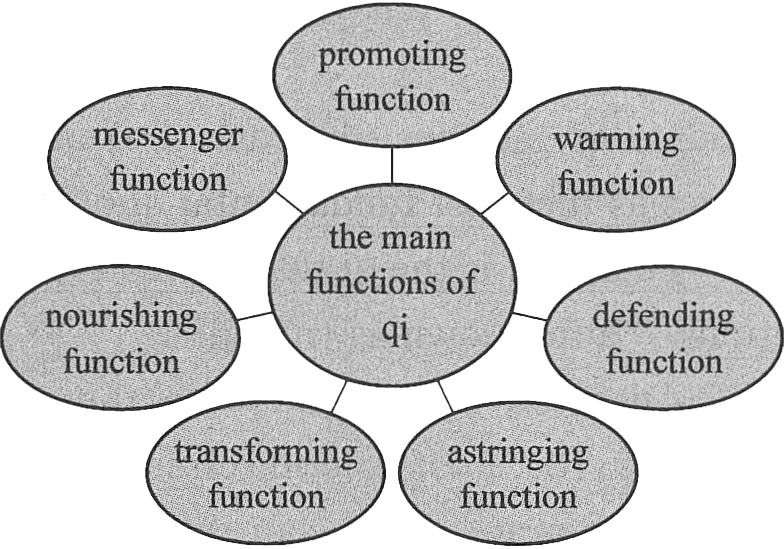
Fig. 3-1 The main functions of qi
Text
Qi is the basic element that constitutes the cosmos and, through its movements, changes and transformations, produces everything in the world, including the human body and life activities. In the field of medicine, qi refers both to the refined nutritive substance that flows within the human body as well as to its functional activities.
As for the sources, there are innate qi and acquired qi. Innate qi is the qi that exists from birth and is stored in the kidneys, also the same as prenatal* qi; while acquired qi is the qi that is acquired after birth and is formed from the food in combination with the fresh air inhaled in the lungs, also the same as post natal qi.
There are many types of qi in TCM, including source qi, genuine qi*, ancestral qi*, nutrient qi*, and defense qi. Source qi is the qi that serves as the most fundamental qi of the human body, also called original or primordial qi, while genuine qi is the qi that serves as the physical substrata and dynamic force of all vital functions,* also known as true qi.
Ancestral qi is the combination of the essential qi derived from food with the air inhaled, stored in the chest, serving as the dynamic force of blood circulation, respiration, voice, and bodily movements, the same as pectoral* qi. It can diffuse into the vessels of the heart to assist the heart in moving blood. Ancestral qi can be sent upwards by the lungs along the respiratory tract to the throat to perform its respiratory function and dominating sound production. It can go down and accumulate in the lower cinnabar field* forming lower sea of qi*. Then via* qichong point (ST30*), it can pour into the stomach meridian.
Nutrient qi is the qi that moves within the vessels and nourishes all the organs and tissues. Nutrient qi is generated from the most nutritious part of the food essence. After its formation, it enters the blood vessels. While they are passing the lungs, the nutrient qi, fresh air and the fluids enter the blood vessels and are transformed into blood by the transformation function of heart qi.
Defense qi is vigorous and powerful, and moves outside the vessels, protecting the body surface and warding off* external pathogens. It is the source of heat and can warm the body to maintain normal body temperature. Defense qi also regulates the opening and closing of the sweat pores and interstices*.
In addition to the source qi, ancestral qi, nutrient qi, and defense qi, there are also visceral qi, bowel qi and meridian qi. All these qi are part of the whole body qi. The body qi distributed to viscera is called visceral qi; the body qi distributed to meridians is called meridian qi; the body qi distributed in the heart is named heart qi, so on and so forth.
In TCM, the basic qi dynamic is generalized into four patterns: upward, downward, inward and outward, though qi moves in all directions. Viscera and bowels, constituents, sense organs and their orifices, meridians and collaterals are all places for qi to move through, and qi dynamic and moving patterns of these organs are controlled by the organs and related to the functions of the organs. For example, spleen dominates up-bearing the clear, so spleen qi is ascending; the stomach governs down-bearing the turbid, so stomach qi is descending.

Fig. 3-1 The main functions of qi
Qi is not only the basic substance for building up the body but most importantly it is the power source for physiological activities in the body. Fig. 3-1 lists the main functions of qi.
Source qi promotes the physiological functions of the viscera so that the viscera can produce blood, body fluids and visceral qi. Ancestral qi diffuses to the heart and vessels, so as to* assist blood circulating. Qi is the commander of blood. When qi flows, blood circulates.
Yang qi can produce heat and is the source of the body heat, and the temperature of the body is maintained by the warming function of qi. Defense qi protects our body and provides defense functions.
Astringing function* refers to the function of preventing the liquid substance from escaping, demonstrated in keeping the blood flowing in the vessels, regulating the secretion of sweat, saliva, gastric juice, intestinal juice and sperm and excretion of urine.*
All changes take place as a result of qi dynamic. Qi can change one thing into another; therefore, it has transformation function*.
Qi also has nourishing function because firstly, qi can transports nutrients to the organs and tissues throughout the body, and secondly, essential qi and nutrient qi have the functions of nourishing the body.
Qi flows everywhere in the body and links all the body parts together by transmitting messages among them, like a messenger. It is an information carrier and carries information to associated places, so that the body can function properly. Therefore, qi also has messenger function*.